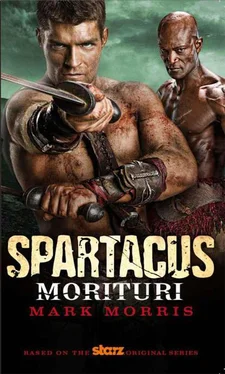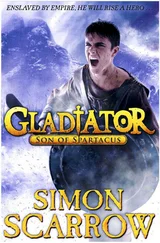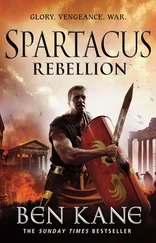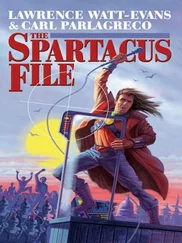Mark Morris - Spartacus - Morituri
Здесь есть возможность читать онлайн «Mark Morris - Spartacus - Morituri» весь текст электронной книги совершенно бесплатно (целиком полную версию без сокращений). В некоторых случаях можно слушать аудио, скачать через торрент в формате fb2 и присутствует краткое содержание. Жанр: Исторические приключения, на английском языке. Описание произведения, (предисловие) а так же отзывы посетителей доступны на портале библиотеки ЛибКат.
- Название:Spartacus: Morituri
- Автор:
- Жанр:
- Год:неизвестен
- ISBN:нет данных
- Рейтинг книги:5 / 5. Голосов: 1
-
Избранное:Добавить в избранное
- Отзывы:
-
Ваша оценка:
- 100
- 1
- 2
- 3
- 4
- 5
Spartacus: Morituri: краткое содержание, описание и аннотация
Предлагаем к чтению аннотацию, описание, краткое содержание или предисловие (зависит от того, что написал сам автор книги «Spartacus: Morituri»). Если вы не нашли необходимую информацию о книге — напишите в комментариях, мы постараемся отыскать её.
Spartacus: Morituri — читать онлайн бесплатно полную книгу (весь текст) целиком
Ниже представлен текст книги, разбитый по страницам. Система сохранения места последней прочитанной страницы, позволяет с удобством читать онлайн бесплатно книгу «Spartacus: Morituri», без необходимости каждый раз заново искать на чём Вы остановились. Поставьте закладку, и сможете в любой момент перейти на страницу, на которой закончили чтение.
Интервал:
Закладка:
His partner, the secutor, meanwhile, simply stood and gaped, his reflexes far too slow to match the sheer speed and agility of Spartacus’s assault. He had barely raised his shield before Spartacus, his momentum continuing to carry him forward, was upon him too, his twin swords a whirling blur of lethal metal.
Desperately the secutor brought up his own sword in defense, only to find less than a second later that his hand, with the sword still clutched in it, was flying across the arena, trailing blood, having been severed neatly at the wrist. The gladiator hadn’t even reacted to the pain before Spartacus’s other sword was flashing up and across, unerringly finding the narrow gap between the top of the secutor’s shield and the bottom of his helmet, and severing his head with one blow.
As the helmeted head landed on the sand with a heavy thud, the secutor’s body, blood spurting from the stump of the neck, folded at the knees and waist and crumpled to the ground.
Spartacus rose slowly from his half-crouch, the blades of his swords dripping blood on to the sand, and glanced round briefly at the screaming, leaping, delirious crowd. Then, without even raising a single sword in acknowledgement, he turned and trudged casually back to where Varro was standing waiting for him, the hacked, bleeding remains of Hieronymus’s gladiators already attracting flies on the sand in his wake.
Varro nodded, and Spartacus nodded back, and then the two of them turned to face Solonius’s men.
“Now that unworthy dogs are despatched, we can fight like true gladiators,” the thraex growled, his voice muffled beneath his helmet. “Prepare to die, Thracian.”
Marcus Crassus lowered his head briefly, his hand rising from his lap at the same moment to cradle it. His thumb and middle finger gently massaged each side of his temple for a few seconds, and then he lifted his head slowly once more and glared at Hieronymus.
The Greek merchant was sitting and shivering on the floor of the pulvinus, out of sight of the crowd, his back pressed against the inside edge of the balcony. He had drawn his knees up to his chin and was now pawing at his lips with his hands, as if in an attempt to drag coherent words from his unresponsive mouth. His black eyes, wide and staring, darted this way and that, as if they were witnessing unimaginable terrors bearing down on him from every direction. Since accusing Batiatus of poisoning him, he had withdrawn into himself, muttering and gibbering, resisting all attempts to draw him out of his shell. Brutilius’s wife had tried for a while, but Hieronymus had flinched as though he thought she meant him harm, and in the end she had given up. Then it had been time for Solonius to announce the primus, since when all eyes had been on the arena.
Now that Spartacus had perfunctorily, even contemptuously, despatched Hieronymus’s gladiators, however (men selected especially for the primus, and therefore, theoretically, the best that his ludus had to offer), Crassus, his professional interest in the contest effectively over, turned his withering attention back to Hieronymus.
“I have invested considerable coin in venture, and will have explanation for this disgrace,” he muttered, spitting out his words like cherry pits. “Speak, Grecian, or prepare to be dragged back to Rome behind my horses and see truth torn from body.”
Hieronymus looked up at him, his mouth opening and closing silently for a moment. Then finally, in a harsh and tortured whisper, he said, “Water.”
The expression on Crassus’s face was less than encouraging.
“What of it?” he snapped.
Hieronymus raised a finger and pointed it waveringly at Solonius and then at Batiatus.
“They …” he gulped, his eyes rolling. “They have … poisoned me.”
Crassus’s dark gaze swept across the faces of the two lanistae.
“Is there truth in his babbling?”
Batiatus smiled, seemingly unruffled.
“I don’t endeavor to speak for the man. Let him offer explanation for belief in such a thing.”
Crassus’s attention snapped back to Hieronymus.
“Yes. Do as he suggests and make clear your meaning.”
“I …” Hieronymus had the wretched look of a man who had a number of paths from which to choose, but who suspected that whatever decision he made would ultimately lead to nothing but his own damnation.
Finally, pointing at Batiatus, he said, “The deception lies with him. He … he claims to provide me with water from Rome. But the water he offers … is not Roman.”
Crassus glared at Hieronymus, and as he did so Batiatus in turn watched Crassus’s face closely. He was mightily relieved to see that, unless the Roman nobleman was an excellent actor, he clearly had no idea what Hieronymus was talking about.
As if to confirm the fact, Crassus threw up his hands and barked, “Babble continues to flow as if water itself. Gather thoughts and sharpen point.”
Hieronymus shook his head and clapped his hands over his face.
“I cannot…” he all but wept. “I cannot.”
Crassus’s eyes blazed, though his voice was dangerously soft. Leaning forward, he said, “You can and will, or suffer consequences.”
Still Hieronymus wept, his hands clapped over his face. Brutilius tore his eyes from the action below for a moment and looked down on him with evident distaste.
“The man appears deranged,” he said. “One remembers that the Greeks are renowned for displays of vulgar emotion. Consequence of imbalance of humors in mongrel blood.”
Crassus shot him a look scathing enough to make the portly nobleman turn pale and promptly close his mouth. Then he turned again to Batiatus.
“Do you understand what the man implies by speaking nonsense of Roman water?”
Calmly Batiatus inclined his head.
“I confess to the grasping of it.”
“Then I demand explanation.”
Batiatus gestured at the jugs of water on the table at the back of the balcony.
“I made arrangement to serve Hieronymus water from the stream that until these several weeks past had supplied my ludus.”
“I would receive reason for it,” Crassus narrowed his eyes. “Does Hieronymus speak truth of this water running with poison?”
“Yes,” Batiatus said bluntly. “But not added by my hand. Nor by good Solonius’s. The stream which runs behind his own ludus was similarly sullied.”
“Whose hand has done it then?”
This time it was Solonius who answered.
“Hieronymus’s himself.”
There was suspicion and incredulity in Crassus’s voice. “Hieronymus poisons himself ?”
Batiatus nodded. “Indeed. Though precise reckoning points to Mantilus’s hand, moved at bidding of Hieronymus.”
Crassus looked more exasperated than ever.
“I ask again for its reason.”
“For victory in the arena,” Solonius said.
“Victory absent honor,” Batiatus added.
Crassus scowled at the both of them-and then understanding slowly began to dawn on his face.
“Hieronymus sought advantage with the act in lieu of his men’s prowess?”
Again Batiatus nodded.
“Our ludii laid low by illness at his hand.”
“Batiatus discovered truth of it, and we joined to avenge slight upon our good names-as was our right,” Solonius said.
“We hesitated to resort to public exposure of his deed-for fear that noble name of Crassus would be sullied by proximity,” Batiatus said. “We simply allowed Hieronymus belief that upper hand was still his to enjoy, that affliction upon both of us still held sway.”
“Whereas in truth strength of warriors was secretly restored?” Crassus said.
Solonius nodded. “To stand ready upon the sands for contest and exposure of Hieronymus’s folly.”
Читать дальшеИнтервал:
Закладка:
Похожие книги на «Spartacus: Morituri»
Представляем Вашему вниманию похожие книги на «Spartacus: Morituri» списком для выбора. Мы отобрали схожую по названию и смыслу литературу в надежде предоставить читателям больше вариантов отыскать новые, интересные, ещё непрочитанные произведения.
Обсуждение, отзывы о книге «Spartacus: Morituri» и просто собственные мнения читателей. Оставьте ваши комментарии, напишите, что Вы думаете о произведении, его смысле или главных героях. Укажите что конкретно понравилось, а что нет, и почему Вы так считаете.












